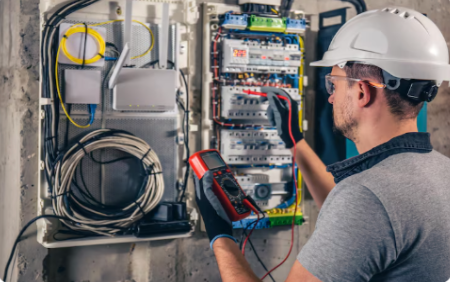The electrical system is the backbone of any modern home, but its inherent power also poses a significant risk if not handled correctly.
A safe and secure electrical installation is not a matter of chance; it is the direct result of professional expertise, meticulous planning, and strict adherence to safety standards.
While DIY projects can be tempting, electrical work is one area where professional knowledge is non-negotiable.
The work of a qualified residential electrician is an investment in your family’s safety and the long-term integrity of your home. This article outlines the key ways a professional ensures every installation is safe, secure, and up to code.
Adherence to Safety Codes and Standards
Every electrical installation, from a new outlet to a complete home rewire, must comply with local and national electrical codes. These codes are not suggestions; they are legally binding rules designed to prevent electrical fires, shocks, and other hazards.
A professional electrician is extensively trained in these regulations and stays updated on any changes. They know the correct wire gauges to use, the proper way to ground a system, and the right placement of GFCI outlets, ensuring every component is installed to the highest safety standards.
Expert Diagnostics and Proper Planning
Before a single wire is run, a qualified residential electrician performs a thorough assessment of the project. They evaluate the existing electrical load, the capacity of your panel, and the specific requirements of the new installation.
This diagnostic phase is crucial for preventing future problems like overloaded circuits. By planning ahead, they ensure the new installation integrates seamlessly and safely with your home’s existing electrical infrastructure.
Using the Right Tools and Materials
Professionals arrive on a job with specialized tools and high-quality, code-compliant materials. They use instruments to accurately test voltage, a non-contact voltage tester to ensure circuits are de-energized, and professional-grade wire cutters and strippers to make clean, precise connections.
They don’t cut corners with cheap, uncertified parts. The use of the right tools and materials is fundamental to a durable and safe installation.
The Expertise of a Residential Electrician
The knowledge and skill of a qualified residential electrician are what truly set them apart. They understand electrical theory, the flow of current, and the intricate details of circuit design.
This expertise allows them to troubleshoot complex issues, anticipate potential problems, and provide solutions that are not just quick fixes but long-lasting and reliable.
Their training ensures that every connection is secure, every wire is properly insulated, and every component functions as intended.
Professional Installation and Quality Assurance
A professional’s work is characterized by precision and attention to detail. Every installation is done with a high degree of craftsmanship, from the clean wiring in the panel to the secure mounting of fixtures. They double-check all connections and test the newly installed circuit to ensure it’s functioning correctly.
This commitment to quality assurance is a hallmark of a professional job and is crucial for the safety and reliability of your electrical system.




